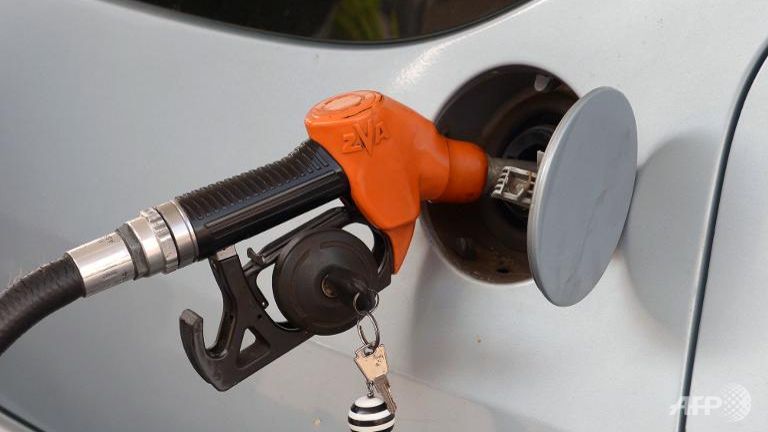Oil prices give back Fed rally
 A motorist filling up petrol at a pump kiosk. (AFP/Fadel Senna) |
NEW YORK: The crude oil market gave back much of its Federal Reserve-sparked rally on Thursday (Mar 19), with prices sinking back on the reality of continued high supplies and a strong dollar.
Oil prices took a sharp jump on Wednesday when the Fed revealed an unexpectedly dovish position on interest rate hikes over the next year, sending the dollar sharply lower.
But the dollar rebounded on Thursday, taking crude lower. In addition, traders said, the new record high for US commercial crude stockpiles and a record production level of 9.4 million barrels a day announced early Wednesday, which should have sunk crude prices then, was back in focus.
US benchmark West Texas Intermediate (WTI) for delivery in April shed US$0.70 to US$43.96 a barrel. Brent North Sea crude for May delivery tumbled US$1.48 to stand at US$54.43 in London trade. WTI had gained US$1.20 on Wednesday and Brent jumped US$2.40 after the US central bank signalled it was in no hurry raise rates, which sent the dollar tumbling.
"Today is kind of what yesterday should have been. Yesterday, I did not see lots of bullish news, but we had this rally probably on the Fed. However, the crude fundamentals remain really bearish, as we saw US crude production reach 9.4 million barrels," said Kyle Cooper of IAF Advisors.
Daniel Ang, an investment analyst with Phillip Futures in Singapore, said prices would remain under pressure for as long as supply was outpacing demand.
"Fundamentals have not changed and just a short-term jolt in prices from the weakening US dollar will not change that fact," he said in a market commentary. "Prices are still going to stay low if demand and supply does not improve."
OPEC members meanwhile have no choice but to maintain current production levels despite falling oil prices in order to preserve their market share, Kuwait's oil minister said on Thursday. "Within OPEC, we don't have any other choice than keeping the ceiling of production as it is because we don't want to lose our share in the market," Ali al-Omair told reporters.
But the minister welcomed any arrangements with non-OPEC crude producers to stabilise the market. "If there is any type of arrangements with countries outside OPEC, we will be very happy," Omair said after signing a cooperation agreement on oil and investment with Russia.
The 12-member Organisation of Petroleum Exporting Countries, that pumps about one-third of the world's oil, decided in November to keep production unchanged, sending oil prices crashing.
What the stars mean:
★ Poor ★ ★ Promising ★★★ Good ★★★★ Very good ★★★★★ Exceptional
Latest News
More News
- ASEAN states unite for future economic stability (March 06, 2025 | 10:41)
- Indonesia plans over 20 energy projects in 2025 (March 05, 2025 | 10:09)
- Bali to use “water taxi” to address traffic congestion (March 04, 2025 | 17:15)
- RoK, Thailand hold 4th round of economic partnership negotiations (March 04, 2025 | 16:48)
- Thailand busts illegal e-money firms (March 03, 2025 | 16:47)
- Thailand to repatriate thousands of scam centre workers from Myanmar (March 03, 2025 | 10:51)
- PM stresses need for ASEAN to embrace new technologies (February 26, 2025 | 17:30)
- The world's future belongs to the youth: PM (February 26, 2025 | 17:23)
- More than 200 foreigners rescued from Cambodian scam centre (February 25, 2025 | 16:06)
- New Zealand PM’s visit to tighten bonds with Vietnam: Ambassador (February 24, 2025 | 11:22)


















 Mobile Version
Mobile Version